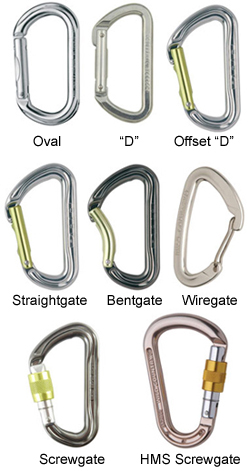Karabiners or Carabiners (aka "krabs" or "crabs") have been around since at least Victorian times, and were used by continental alpinists prior to the First World War but only really caught on in the British climbing scene in the late 1940s when masses of ex War Department ones became available. In recent years the design of karabiners has gone through a rapid period of evolution with ever lighter and more radical models appearing.

Karabiners were originally made from steel and were Oval, but it was soon found that "D" shaped ones were stronger and that these could be given a greater gate opening by making them as an Offset "D". In the 1970s alloy karabiners replaced steel for mountaineering use as they were so much lighter. Initially these were quite big for strength but improved design reduced the size and weight. Original krabs were Straight Gate, then Bent Gates were developed to allow easier clipping when sport climbing. In the mid-90s, Wire Gates, despite being derided initially as nappy pins, revolutionised karabiner design, enabling considerable weight savings to be made.
Screw Gates are designed for use where it is especially important that the gate remains closed (eg belays) and the HMS version (Halbmastwurfsicherung) was originally designed for use with a Munter (or Italian) hitch for belaying and abseiling, but are now much used with belay devices - though specialist Belay Karabiners, which prevent dangerous cross-loading, are a better choice.
In recent years, new innovative designs have appeared such as Pulley Karabiners and Locking Karabiners that do not have a screwgate.
The strength of karabiners is rated in kiloNewtons (kN) and are usually given for gate closed (along the back), gate open (along the back) and cross-loaded (between the back and the gate). A fall can engender forces of up to ca 6kN so it is important that all aspects of a karabiner are stronger than this. In the early days of lightweight krab design (ca 1980!) gate open strengths were not very high and karabiners could break in a fall if the gates were knocked open or the krab was cross loaded. These days karabiners have very high gate open and cross loading strengths meaning that modern karabiners made by a reputable firm are most unlikely to break.
One thing for certain is that today's climber would probably find it hard to imagine, or indeed manage, climbing without karabiners - they are so fundamental to modern mountaineering, yet British climbers did just that for well over 50 years from the foundation of the sport in the early 1880s and it was only after WWII that they became widely available.